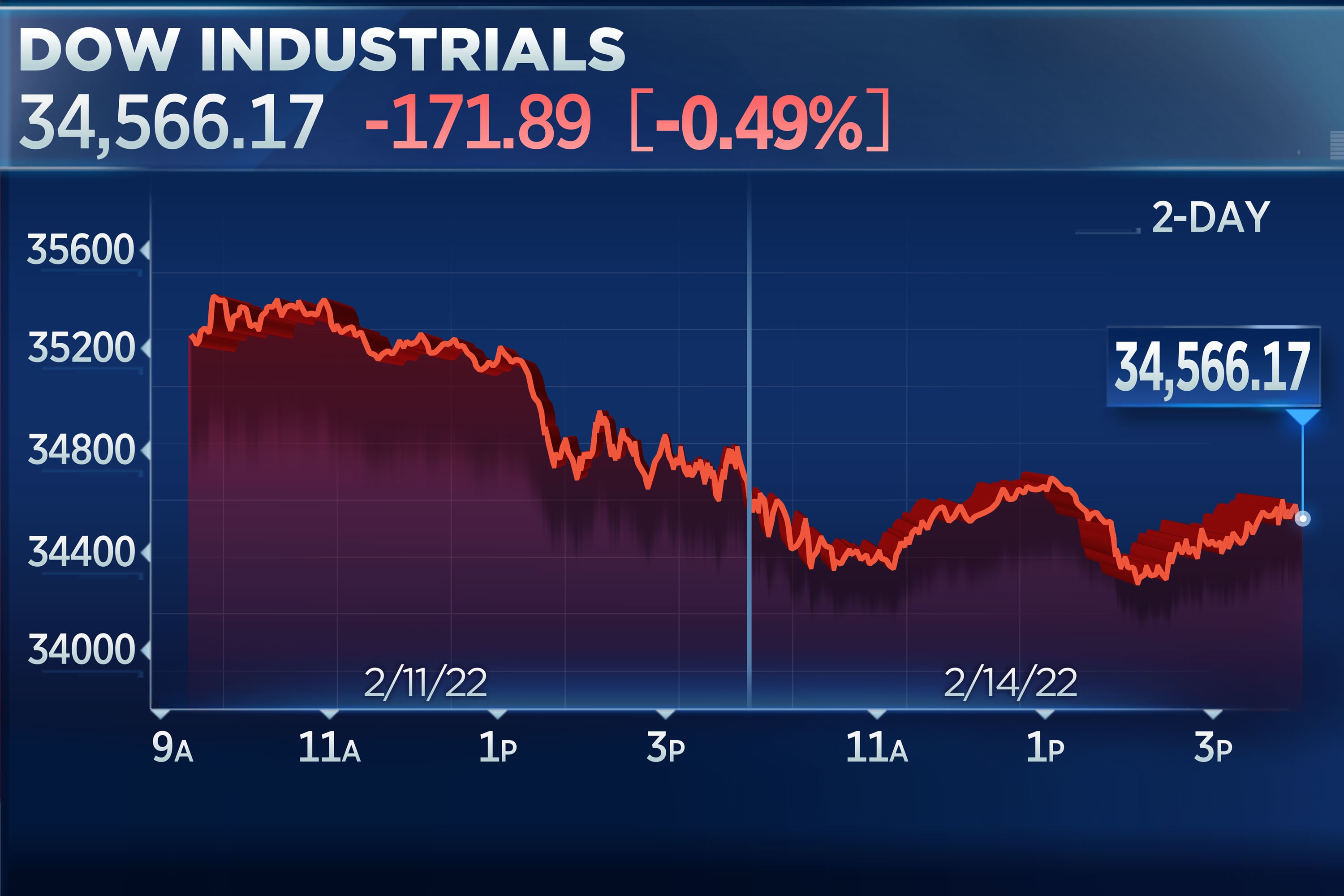
The Dow Jones Industrial Average and S&P 500 retreated on Monday as investors evaluated concerns about the Federal Reserve’s plan for interest rate hikes and tensions between Russia and Ukraine.
The Dow fell 171.89 points to 34,566.17, dragged down by losses in Walgreens Boots Alliance and Chevron. The S&P 500 fell 0.4% to 4,401.67, while the technology-heavy Nasdaq Composite closed less than one point lower at 13,790.92. The Nasdaq was up nearly 1% earlier in the session.
Investors have been monitoring headlines related to the Russia-Ukraine conflict. Oil prices were lower for most of the trading day Monday, but an afternoon run sent West Texas Intermediate futures up 2.6% to above $95 per barrel, and stocks lower. It was not immediately clear what drove the late-session action, but the U.S. is closing the Kyiv embassy. Secretary of State Antony Blinken cited the “dramatic acceleration in the buildup of Russian forces” on Ukraine’s border.
The Cboe Volatility Index — which is known as Wall Street’s fear gauge — spiked to near its session highs in afternoon trading, briefly hovering around 31. It ended the day above 28 points.
The risk-off move hit industrial stocks like Caterpillar and Boeing, which fell 0.7% and 1.1%, respectively.
“The outlook for global equity markets remains weak in our view, with markets under pressure not just because of rising bond yields globally and the prospect of rate hikes, but also geopolitical tensions,” said David Sneddon, technical analyst at Credit Suisse.
Still, it wasn’t all pessimistic positioning on Monday. The VanEck Russia ETF, a U.S.-traded security which invests in top Russian companies, closed up 2.5%, along with the Russian ruble vs. the U.S. dollar. The VanEck Russia ETF lost more than 7.5% on Friday.
Oil stocks, which outperformed during Friday’s Ukraine-driven trading, were down on Monday. Exxon Mobil fell 1.5% and ConocoPhillips slipped 2.1%.
On Monday morning, St. Louis Fed President James Bullard told CNBC that the central bank needed to fight inflation more aggressively, echoing comments he made last week that pressured the stock market.
“I do think we need to front-load more of our planned removal of accommodation than we would have previously. We’ve been surprised to the upside on inflation. This is a lot of inflation,” Bullard told CNBC’s Steve Liesman during a live “Squawk Box” interview.
“Our credibility is on the line here and we do have to react to the data,” he added. “However, I do think we can do it in a way that’s organized and not disruptive to markets.”
The Labor Department reported Thursday that inflation in January surged 7.5%, its biggest 12-month gain since 1982.
“My interpretation was not so much that report alone, but the last four reports taken in tandem have indicated that inflation is broadening and possibly accelerating in the U.S. economy,” said Bullard in reference to last week’s hot CPI report.
Markets are now expecting a 50 basis point, or 0.5 percentage point, increase at the central bank’s March meeting.
Economists at Goldman Sachs also raised their Fed forecast to seven hikes for 2022, and said it sees the 10-year yield hitting 2.25% this year. The firm also lowered its 2022 S&P 500 price target to 4,900 from 5,100. That would represent just a 2.8% return from where the benchmark ended 2021. Goldman said that higher rates will crimp valuations.
Investors have been grappling with a potential war between Russia and Ukraine and a phone call over the weekend between U.S. President Joe Biden and Russian President Vladimir Putin, in which Biden attempted to dissuade Putin from attacking Ukraine, failed to achieve a breakthrough.
Some airlines have also halted or redirected flights to Ukraine amid the brewing crisis, while the Pentagon ordered the departure of U.S. troops in Ukraine.
Sentiment was helped following comments from Russia’s Foreign Minister Sergey Lavrov to Vladimir Putin in Moscow that suggested Russia would continue diplomatic talks with the West over Ukraine.
“While the risk of conflict in Ukraine is high, it should have limited impact on global equity markets and would likely prompt a dovish reassessment by [central bankers],” said Marko Kolanovic, JPMorgan chief global market strategist.
On Friday, the major averages declined as the White House warned that a war in Ukraine could begin “any day now” and urged Americans there to leave “immediately.”
“The real fear is that China backs Russia and the relationship between China and the U.S. continues to deteriorate,” said Robert Cantwell, chief investment officer at Upholdings. “How it changes the U.S. relationships with the other economic superpowers – that’s what’s really scary and would affect economic outcome.”
— with reporting from CNBC’s Jesse Pound.




